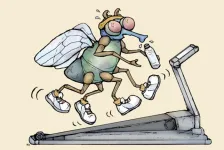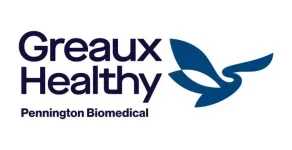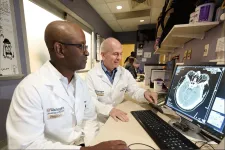Scientific review reveals top three effective ways to stop smoking
UMass Amherst health policy expert offers insight from the Cochrane Tobacco Addiction Group
2024-09-05
(Press-News.org)
A major new review of evidence by a team of scientists, including a University of Massachusetts Amherst public health researcher, has identified the three best strategies for quitting smoking:
Varenicline – a prescription drug sold under the brand names Chantix and Champix, among others.
Cytisine – a plant-based compound not widely available in the U.S. but sold as an over-the-counter natural health product (Cravv®) in Canada and throughout Central and Eastern Europe, and available under prescription in the United Kingdom.
Nicotine e-cigarettes.
The review, published Sept. 4 in the journal Addiction, was conducted by the non-profit Cochrane Tobacco Addiction Group (CTAG) and led by senior author Jamie Hartmann-Boyce, assistant professor of health policy and management in the UMass Amherst School of Public Health and Health Sciences, and lead author Jonathan Livingstone-Banks, a University of Oxford researcher in England.
Worldwide, smoking is the leading cause of preventable disease and death, resulting in more than seven million deaths per year. “For people who smoke cigarettes, the single best thing they can do for their health is to quit smoking,” says Hartmann-Boyce, a Cochrane editor who conducted research at Oxford before joining UMass Amherst. “However, many people find it difficult to do so. Fortunately, there is strong evidence to support the use of a number of different ways to quit smoking.”
The three top strategies for quitting work best when combined with behavioral support, such as counseling, the review states. Bupropion and nicotine replacement therapy (NRT) are also effective, especially NRT patches combined with fast-acting forms like gum. “For behavioral support, evidence is strongest for counseling and for programs that reward people for stopping smoking,” Hartmann-Boyce adds.
CTAG’s new summary outlines the key findings from 14 Cochrane reviews that CTAG published between 2021 and 2023. Three Cochrane reviews included in this summary are particularly noteworthy:
The updated Cochrane review on NRT for smoking cessation found high-certainty evidence that combining a fast-acting form of NRT (gum, lozenges, sprays) with NRT patches helped more people to quit than single-form NRT alone.
The Cochrane review of e-cigarettes for smoking cessation is a living systematic review: review authors search for new studies monthly and update the review whenever new data emerge. The latest update concluded that there was high‐certainty evidence that e-cigarettes with nicotine increase quit rates compared with NRT, and moderate‐certainty evidence that they increase quit rates compared with e-cigarettes without nicotine.
The 2023 Cochrane review of pharmacological and e-cigarette interventions for smoking cessation included all drugs licensed as treatments for smoking cessation anywhere in the world, as well as e-cigarettes with or without nicotine. The review included 319 studies (157,179 participants). The most effective interventions were nicotine e‐cigarettes, varenicline and cytisine, all of which had high-certainty evidence, closely followed by combination NRT.
The updated Cochrane review on nicotine receptor partial agonists (varenicline and cytisine) for smoking cessation found that, in studies directly comparing cytisine and varenicline, there may be no difference between either medication for quitting smoking. The review included 75 trials.
“Our team will continue to review evidence on the best ways to help people quit smoking, as we know how vitally important this is to people who smoke and to public health,” Hartmann-Boyce says.
END
ELSE PRESS RELEASES FROM THIS DATE:
2024-09-05
As genetic sequencing technology becomes more accessible and efficient, researchers have made significant strides in understanding the genetic underpinnings of various diseases. This knowledge has led to a surge in clinical applications of genetic testing, offering hope and improved outcomes for individuals affected by many genetic diseases and disorders. Despite these successes, scientists continue to try to improve genetic testing technologies, because many individuals with rare diseases remain undiagnosed even after current state-of-the-art genomic testing.
Scientists at the HudsonAlpha Institute for Biotechnology ...
2024-09-05
A new study, published in Nature Communications this week, led by Jake Gavenas PhD, while he was a PhD student at the Brain Institute at Chapman University, and co-authored by two faculty members of the Brain Institute, Uri Maoz and Aaron Schurger, examines how the brain initiates spontaneous actions. In addition to demonstrating how spontaneous action emerges without environmental input, this study has implications for the origins of slow ramping of neural activity before movement onset—a commonly-observed but poorly understood ...
2024-09-04
(Millbrook, NY) The Hudson River Foundation for Science and Environmental Research (HRF) has awarded $1.7 million to Cary Institute of Ecosystem Studies to monitor the Hudson River’s lower food web for three years. The project is an integral component of the $6.5 million Hudson River Ecosystem Monitoring Program, a collaboration of HRF and New York State Department of Environmental Conservation (DEC) to develop and implement the next generation comprehensive ecosystem monitoring program on the Hudson.
Cary’s Chris Solomon will lead the Interim Lower Food Web Survey to provide ...
2024-09-04
BLOOMINGTON, Ind. — Indiana University researchers will lead a multi-institutional team of experts in areas such as informatics, psychology, communications and folklore to assess the role that artificial intelligence may play in strengthening the influence of online communications — including misinformation and radicalizing messages — under a $7.5 million grant from the U.S. Department of Defense.
The project is one of 30 recently funded by the department’s Multidisciplinary University ...
2024-09-04
UNIVERSITY PARK, Pa. — Butterflies can see more of the world than humans, including more colors and the field oscillation direction, or polarization, of light. This special ability enables them to navigate with precision, forage for food and communicate with one another. Other species, like the mantis shrimp, can sense an even wider spectrum of light, as well as the circular polarization, or spinning states, of light waves. They use this capability to signal a “love code,” which helps them find and be discovered by mates.
Inspired ...
2024-09-04
Fruit flies walking on miniature treadmills are helping scientists learn how the nervous system enables animals to move in an unpredictable and complex world.
Insights from using these fruit fly-sized treadmills were reported Aug. 30 in Current Biology, a Cell Press journal. Several videos of the flies running on the treadmills are available for viewing on the online research paper. The lead author is Brandon G. Pratt, a recent physiology and biophysics Ph.D. graduate of the University of Washington School of Medicine in Seattle and a National Science Foundation ...
2024-09-04
A physics student at The University of Texas at Arlington studying ways to measure the mass of tiny particles called neutrinos has earned a prestigious national award for her research.
Senior Kara Stogsdill received the Outstanding Undergraduate Research Award from the Society of Physics Students, an organization of the American Institute of Physics. The award is given to students based on exceptional research achievements in any physics-related field.
Stogsdill’s research is part of the Project 8 Neutrino Mass Experiment, which includes faculty and students from UTA and 13 other universities and national laboratories ...
2024-09-04
Pennington Biomedical Research Center is formally launching Greaux Healthy, a public service initiative designed to help improve kids’ health at every age. Developed with funding from the State of Louisiana, Greaux Healthy implements 35 years of Pennington Biomedical research and discoveries to inform tools, resources and programing for children, parents, physicians and educators throughout the state.
The Greaux Healthy initiative is developing a wide variety of educational materials distinctly tailored to four priority populations, including expectant families and parents of infants, ...
2024-09-04
Highlights:
Researchers from Michigan State University and South Shore Hospital in Massachusetts have uncovered a connection between two common diabetes drugs — insulin and metformin — identified in wound exudates of diabetic foot ulcers, which may improve their healing.
While analyzing wound exudate (the fluid the body moves and secretes to the site of an injury), researchers discovered the presence of metformin in patients who take the drug orally.
The researchers then explored metformin’s relationship ...
2024-09-04
Stroke patients who survive a blood clot in the brain’s blood vessels are prone to developing new blockages during their recovery periods, even if they receive vessel-clearing interventions. In an effort to avoid further clots, doctors at 57 sites around the U.S. tested a possible solution: the addition of anti-coagulant drugs to medicine that dissolves blood clots.
But results from the clinical trial, led by Opeolu Adeoye, MD, head of the Department of Emergency Medicine at Washington University School of Medicine in St. Louis, indicate two such drugs did not improve outcomes.
The findings are available Sept. 4 in The New England Journal ...
LAST 30 PRESS RELEASES:
[Press-News.org] Scientific review reveals top three effective ways to stop smoking
UMass Amherst health policy expert offers insight from the Cochrane Tobacco Addiction Group






